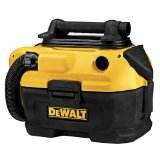DEWALT DCV581H 18/20-Volt MAX Cordless/Corded Wet-Dry Vacuum
- Can operate corded with an AC outlet, or cordless by an 18V or 20V MAX battery
- HEPA Rated filter traps up to 99.97% efficiency
- Washable/reusable filter
- Crush-resistant 5ft hose
- On-board storage for easy transport
The DEWALT DCV581H 18/20v MAX* Cordless/Corded Wet-Dry Vacuum has the ability to provide cordless or corded operation powered by either an 18v or 20v MAX battery or an AC outlet. It features a HEPA rated wet/dry filter that traps dust with 99.97% efficiency at 1 micron. The filter is easily accessible, washable/reusable (use tap or water rinse to clean). This unit has a heavy-duty crush-resistant fully integrated 5′ (by 1-1/4″ diameter) hose which provides durability, flexibility and ease of use. The on-board hose and accessory storage makes the vacuum easy to carry and transport. Also comes with a crevice tool attachment and a wide nozzle tool attachment. Battery and charger sold separately.
List Price: $ 224.40
Price: $ 109.99
Vacuum Accessories Craftsman


Not bad for a lightweight battery shopvac,
As for power goes, its defiantly no shopvac replacement but something in addition to a corded shop vac with a larger motor and capacity. I also own a 5 gallon shop vac and the power of that vacuum is MUCH more powerful. This is not the tool to pick up screws and bolts and other hard core construction debris. Leave that to a larger unit. But to clean up smaller jobs, drywall dust, your car, anything small where you don’t want to plug in this is a must have tool from Dewalt. I’m already fully vested in the Dewalt line of tools and have a few 4 amp hour batteries that I’ll test next and see how long they last versus the 3 amp hour one. I would recommend this to others if they want something light, portable, and cordless.
I would also recommend that you go to a big box store and buy a 1 1/4 brush attachment for the vacuum. It makes cleaning up cars with auto carpet much easier and a must have tool in my opinion.
0
Was this review helpful to you?

|Toss-up in comparison with DC500,
So here it goes (keeping in mind that this review focuses on the 18V XRP NiCad operation of both models):
1) The DCV581H uses a slightly larger-diameter hose, but that mostly meant that more time was wasted unplugging it, when it picked up objects that it didn’t have the power to get all the way through the hose. This feature – an occasional annoyance with the DC500 – is a much more significant downside of the DCV581H, at least in its operation on 18V NiCad batteries. Advantage: DC500
2) The battery port of the DCV581H is fully exposed (compared to the battery-behind-a-door construction of the DC500). And while it does make changing batteries faster and easier, it also creates a significant potential dust and debris collection site (even more so, one would guess, if operated on AC without a battery in place). Advantage: DC500
3) The DCV581H is significantly larger/bulkier/heavier than the DC500, and also seems a little bit out of balance, at least with an 18V XRP NiCad in place. (In this reviewer’s applications, this has meant that the DC500 is still the vacuum that goes up ladders, into crawl spaces, etc., while the DCV581H tends to more “domestic” chores.) Advantage: DC500
4) While the DCV581H seems a bit more powerful when starting on a fresh battery (again, an 18V XRP NiCad, in this comparison), it starts slowing/decreasing power almost immediately, whereas the DC500 maintains near-full power until a very obvious drop in suction occurs when the battery is nearly discharged. Advantage: DC500
Miscellaneous complaints and compliments: Making the filter smaller on the DCV581H doesn’t help encourage the changeover for DC500 owners – especially those with a spare (and ultra-expensive) HEPA filter on hand for the older vacuum. Similarly, the change in hose/nozzle/fitting sizes seems mostly designed to annoy faithful DeWalt customers who own the older model – especially since the DCV581H doesn’t seem to the have the power to justify/support the new hose size, at least on 18V NiCad-powered operation. On the other hand, the (even-greater) flexibility in power sources for the DCV581H is a tremendous plus (and this owner of more than 20 DeWalt 18V tools hopes that it signals DeWalt’s ongoing commitment to supporting and expanding the 18V line, rather than just a one-shot curiosity).
Summary: In spite of its modest shortcomings in comparison with the DC500 in its 18V XRP NiCad battery-powered operations, the DCV581H is, clearly, the DeWalt vacuum of the future, with its acceptance of Li-ion batteries in addition to the 18V NiCad batteries. If one has – or is planning to acquire – any Li-ion battery tools, the DCV581H is, obviously, the way to go. For those of us vested in the 18V system, though, it’s a harder call. Personally, this reviewer would opt for the DC500, as his has given him 6+ years of ongoing near-constant use, interrupted only by its blowing of (an annoyingly hard-wired) fuse. If you’re a heavy user of vacuums in tight/high/awkward spaces – and especially if you’re a major shareowner in the DeWalt 18V line – the DC500 is probably a better choice, at least while it’s still readily available. But if you’re looking ahead, and the future appears to include a shift to 20V (like a 20V Max framing nailer?!), the DCV581H could be a good bridge to the 20V future.
0
Was this review helpful to you?

|